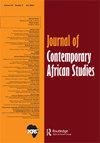The policy or the person? A corpus-based functional analysis of manifestos of two political parties in Ghana
IF 0.8
Q2 AREA STUDIES
引用次数: 0
Abstract
Containing the set of policies that political parties stand for and wish to implement if they are elected to govern a country, manifestos are a campaign tool used by political parties to persuade the citizenry to vote in a certain direction. This paper uses corpus-linguistic methods to investigate the key concepts in the manifestos of two Ghanaian political parties, namely: the New Patriotic Party (NPP) and the National democratic Congress (NDC). The objective is to examine the strategies and the focus of the manifestos of the two parties. The analysis reveals that while the NPP target both policy and the personalities of their opponent candidates, the NDC appear to focus mainly on policy. The paper concludes that, be it a focus on policy or personality, contextual relevance is the key. Thus, the paper proposes a relevance model of political campaign discourse. The paper has implications for political discourse, political campaigning and political communication.是政策还是人?基于语料库的加纳两党宣言功能分析
宣言包含了政党所主张的一系列政策,如果他们被选举来治理一个国家,他们希望实施这些政策。宣言是政党用来说服公民向某个方向投票的竞选工具。本文使用语料库-语言学方法来研究两个加纳政党宣言中的关键概念,即:新爱国党(NPP)和全国民主大会(NDC)。目的是审查两党宣言的战略和重点。分析显示,虽然NPP的目标是政策和对手候选人的个性,但NDC似乎主要关注政策。本文的结论是,无论是关注政策还是个性,语境相关性都是关键。因此,本文提出了政治竞选话语的关联模型。本文对政治话语、政治竞选和政治传播具有启示意义。
本文章由计算机程序翻译,如有差异,请以英文原文为准。
求助全文
约1分钟内获得全文
求助全文
来源期刊

Journal of Contemporary African Studies
AREA STUDIES-
CiteScore
2.20
自引率
0.00%
发文量
18
期刊介绍:
Journal of Contemporary African Studies (JCAS) is an interdisciplinary journal seeking to promote an African-centred scholarly understanding of societies on the continent and their location within the global political economy. Its scope extends across a wide range of social science and humanities disciplines with topics covered including, but not limited to, culture, development, education, environmental questions, gender, government, labour, land, leadership, political economy politics, social movements, sociology of knowledge and welfare. JCAS welcomes contributions reviewing general trends in the academic literature with a specific focus on debates and developments in Africa as part of a broader aim of contributing towards the development of viable communities of African scholarship. The journal publishes original research articles, book reviews, notes from the field, debates, research reports and occasional review essays. It also publishes special issues and welcomes proposals for new topics. JCAS is published four times a year, in January, April, July and October.
 求助内容:
求助内容: 应助结果提醒方式:
应助结果提醒方式:


